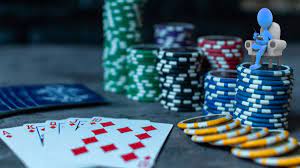For those of us intertwined in this competitive world of online poker we breach the boundaries every day of the game being just a fun hobby, outright competition, a risky business, or even a merciless illness. What exactly it means to any of one us could be a combination of these or many other schemes we self manifest if only to enhance our enjoyment of the game.
While I was researching the various internet poker sites, I discovered the thin line between the thin veneer of the game and the darkness of addiction. Now, I realized that darkness was not just a absence of light. It was an active hiding place within all of us, where the fun and enjoyment of poker were elusive.
addiction occurs when a poker player hinders his own enjoyment of the game, whether through bad beats, bad luck, or the constant desire to improve one’s poker hand, to meet one’s opponent “on the other side”.

In order to survive the psychological trials of poker, we must learn to harness the same psychological forces that would otherwise help us to protect ourselves from addiction, and transform them into forces for good. Here are a few simple yet powerful techniques I have learned through the many months of competing and watching others play that have helped me to remain focused and disciplined.
1) Choose your opponents carefully – You will always beat them at their own game, if you are able to. Because they are bad beats, you will eventually beat them at their own game.. hesitate only a moment to do this as your competition will likely attack you.
2) Learn your opponents’ tendencies – I often examine a player’s statistics (wins and losses) daily, and now more than ever, online poker is about tracking your opponent’s habits by watching for statistically predictable hands and actions. Remember a face check of your opponent will often reveal a lot more about them than you could ever have guessed.
3) Heads up the bad boy – When you sit down at your first real heads up game, whether at Full Tilt Poker or PokerStars, I advise you to EVASION your opponents as to the quality of their poker hand, based on their reactions and actions. How do they react? What hands do they call/raise, check/fold, and what kind of card patterns do they exhibit? Knowing this, and applying it to your game, will help you to make quicker, better, and ultimately winning decisions.
4) Be consistent – Beating the fish and getting the cash is a marathon, not a sprint. Raise your stakes, get out of your comfort zone, and make the mental and financial transition as smooth as possible.
5) Be patient – Beating the fish and getting the cash is a marathon, not a sprint. Many poor poker players throw caution to the wind and press their entire bankroll into the game’s outcome. This is a recipe for disaster and could wipe you out in hours, rather than the few minutes you might have spent at the previously slow but sure poker table.
6) Recognize the situation – If you are playing in a particular tournament, and you are doing fairly well, it is okay to take a break. Get up and take a break, this should not cause you to quit your play completely.
7) Be positive – You are not going to win every poker hand you play. Be positive, and as your bankroll grows, you will make positive adjustments to your mindset. When you are winning, you will want to become even better. When you are losing, and you happen to have the chip lead, you will want to even up your game even more.
These tips for beating the fish are by no means the only means of establishing yourself as a better player, but they are a good start. I have written quite a bit on the methods of winning poker, but these are the Foundation. You can add many more to your arsenal.